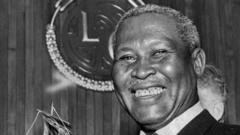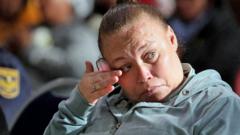The South African National Prosecuting Authority is set to present new evidence in court regarding the death of anti-apartheid figure Chief Albert Luthuli, decades after his case was officially ruled an accident. The family and activists have long challenged the original findings—the 1967 inquest concluded Luthuli was walking on a railway line when struck by a train. However, many suspect that authorities covered up the circumstances surrounding his death. As South Africa commemorates the ongoing struggle against apartheid, the reopening of this inquest aims to shed light on Luthuli's mysterious demise and possibly seek justice for a leader who was pivotal in the fight against racial oppression.
Reopening the Inquest: Justice for Chief Albert Luthuli Finally on the Horizon?

Reopening the Inquest: Justice for Chief Albert Luthuli Finally on the Horizon?
A South African court prepares to revisit the controversial death of Nobel laureate Albert Luthuli, long suspected to have been a victim of foul play.
In 1967, a South African inquest determined that Chief Albert Luthuli, the first African Nobel Peace Prize laureate, died after being hit by a train, a verdict his family and supporters have disputed for years. Now, the National Prosecuting Authority (NPA) is moving to overturn that ruling, presenting what they describe as new evidence. Activists believe foul play may have been involved, prompting calls for justice.
Luthuli was a key figure in the struggle against apartheid and the African National Congress's (ANC) leader during a politically turbulent time. He won the Nobel Peace Prize in 1960 for his efforts to dismantle the oppressive regime. Despite the inquest's initial conclusion of accidental death, campaigners have long suspected a government cover-up, particularly as Luthuli was heavily monitored by authorities.
Albert Mthunzi Luthuli, the Nobel laureate's grandson, expressed happiness with the reopening of the inquest, even as he lamented the lost years in seeking accountability for those he believes were involved in his grandfather's death. Luthuli's tragic fate is echoed in other ongoing investigations into anti-apartheid activists, including the reexamination of the murder case of lawyer Mlungisi Griffiths Mxenge.
As South Africa reckons with its violent past, the inquest could play a crucial role in uncovering the truth behind Luthuli's death and the systematic oppression that defined an era. With the courts now poised for new discoveries, the public remains hopeful for justice long overdue.
Luthuli was a key figure in the struggle against apartheid and the African National Congress's (ANC) leader during a politically turbulent time. He won the Nobel Peace Prize in 1960 for his efforts to dismantle the oppressive regime. Despite the inquest's initial conclusion of accidental death, campaigners have long suspected a government cover-up, particularly as Luthuli was heavily monitored by authorities.
Albert Mthunzi Luthuli, the Nobel laureate's grandson, expressed happiness with the reopening of the inquest, even as he lamented the lost years in seeking accountability for those he believes were involved in his grandfather's death. Luthuli's tragic fate is echoed in other ongoing investigations into anti-apartheid activists, including the reexamination of the murder case of lawyer Mlungisi Griffiths Mxenge.
As South Africa reckons with its violent past, the inquest could play a crucial role in uncovering the truth behind Luthuli's death and the systematic oppression that defined an era. With the courts now poised for new discoveries, the public remains hopeful for justice long overdue.



















